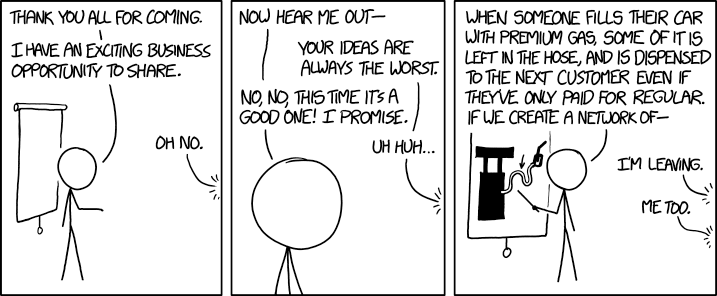from the not-really-sure-that-makes-sense... dept
For many years we've pointed out that
ideas are easy but execution is hard. Unfortunately, as a society, we seem to romanticize and celebrate the idea over the execution -- and our policies, such as patent policies -- codify that into law. This is unfortunate -- especially for anyone who has actually executed and built a real business, since you quickly learn that the original idea is quite frequently meaningless by the time you build a successful business. Earlier this year, we noted that Dilbert creator Scott Adams had
jumped on board the whole "ideas vs. execution" dichotomy, and he's apparently still working that theme.
In a recent blog post, he not only reiterated the "ideas are worthless, execution is everything" claim but tried to take it further by suggesting (as an idea) that it might help if there was a business to
bring ideas together with people to execute. Now, of course, this is just an idea and, according to Adams' own rules, it's pretty worthless. My guess is that if people tried to execute on this particular idea, they'd find that it didn't work quite the way Adams' predicts (which is sort of the point). The basic idea is that people with ideas would tape themselves in a video talking about the idea and then others who might provide related services -- such as management, capital, legal, sales, etc. -- could join up. If a "complete team" was put together via this system, then they could go execute. The concept is to remove some of the inefficiency in executing.
In my imagined future, you start by making a home video of yourself pitching your idea, just as you would to an investor. You upload your video, along with a detailed description of your idea, to a web site where other entrepreneurs around the world are doing the same thing. But instead of simply soliciting funding, you solicit an entire team, based on whatever skills your business requires. The key to making this work is that no one quits his existing job, or provides funding, until all of the resources for the idea are lined up. The main function of the system is making sure everyone's conditions for participation have been met before any risks are taken.
Now imagine that the legal contracts for your new business partners are based on standardized agreements that have been created by the online business to be fair to both sides. There's no wrangling about the legal details. All you need to agree on are the "fill in the blank" stuff, such as who does what, and for what equity or salary. Likewise, the funding agreements are standardized.
As the entrepreneur, you might have a hundred people vying for the job of marketing for your new company. Each person would submit a resume, perhaps some text on how they would approach this specific job, and a minimum compensation requirement. The entrepreneur might choose a marketing expert with weaker experience to keep payroll low, which might in turn cause another potential team member to back out if he thinks the marketing person is too weak for the job. This process of adding and subtracting potential team members would repeat until everyone was happy with the contribution and compensation of everyone else. And during the process, all potential team members could communicate with each other to negotiate deals and refine the idea.
Of course, to some extent, things like this have already been tried. There are incubators out there. There are standard legal forms. There are all sorts of entrepreneurial groups that try to bring such people together. But, for the most part, they don't seem to work all that well -- and a big part of the reason for that is the basic worthlessness of ideas. For an idea to really be executed, you don't just need the ten pieces that Adams lists out -- you need a real champion. Ask most angel investors and venture capitalists what they invest in, and it's not the idea but, quite frequently, it's the team and their overall ability to execute. Working on a startup with cofounders is, in many ways, similar to a marriage. Making sure those people can actually execute well together is a key part of it -- and this setup seems to minimize that, again focusing on the "idea" as the central focal point.
In reality, however, if you're so focused on the idea, when the market changes or reality sets in, the team is less able to adjust and to change and to adapt. Adams' basic premise is correct: ideas are worthless compared to execution but the response to that is aiding with execution in a way that lets people adapt quickly over time, rather than still setting up the key "idea" as the focal point.
In the end, I tend to think Adams' idea for "monetizing" ideas is about as likely to work as the following idea from another well-known comic creator, Randall Munroe, whose
recent xkcd covers the same topic from a slightly different angle:

Filed Under: business models, expression, ideas, randall munroe, scott adams



